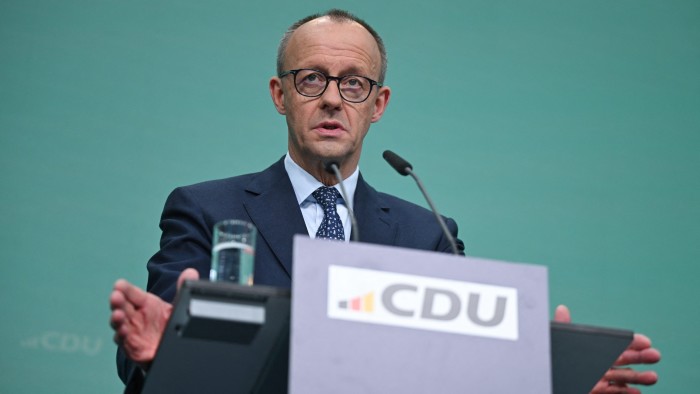Stay informed with free updates
Simply sign up to the German politics myFT Digest — delivered directly to your inbox.
German election winner Friedrich Merz is exploring ways to loosen the country’s strict borrowing cap by reconvening the outgoing parliament where mainstream parties still hold a supermajority.
Speaking to journalists on Monday, the leader of the centre-right Christian Democratic Union said he regretted that far-right and far-left parties secured more than a third of the seats in the Bundestag, giving them the power to block any constitutional changes, including to the so-called debt brake.
Both the Alternative for Germany (AfD) and Die Linke have said they opposed reforming the debt brake to fund more defence spending.
But Merz remarked that mainstream parties could still act under the current legislature, which is running until March 24. He would hold talks with the Social Democrats, the Greens and the liberal Free Democrats about finding a solution before then, he said.
“Before I speculate publicly about it, allow me to talk about it with the Social Democrats, the FDP and also the Greens now in the next few days . . . So that means we still have four weeks to think about it,” he said.
Merz added that the Bundestag was “able to make decisions at any time” and “act without any interruption, even after elections”.
His CDU and its Bavarian sister party CSU have won German parliamentary elections with 28.5 per cent of the vote, clearing the way for Merz to succeed Olaf Scholz as chancellor. But the AfD and Die Linke have together won more than the 210 seats needed for a “blocking minority”.
That gives them the power to prevent any amendment to Germany’s debt brake, a rule enshrined in the constitution in 2009 to limit government borrowing and keep the structural deficit at 0.35 per cent of GDP.
The same condition applies for creating a special off-balance sheet fund such as the €100bn pot announced by Scholz in 2022 to fund an overhaul of the German armed forces after Vladimir Putin’s full-scale invasion of Ukraine.
During the campaign Merz insisted he was committed to the debt brake, while not ruling out discussions over how to amend it. But economists have warned that without changing the provision or creating a special off-budget fund, it will be impossible to finance tens of billions of euros of urgently needed extra investment in the Eurozone’s largest economy.
That includes money for crumbling transport and communications infrastructure as well as a much higher defence budget in the wake of Russia’s full-scale invasion of Ukraine.
The scale of the challenge has been compounded by US President Donald Trump’s recent pivot towards Russia and his threat to pull US security guarantees from Europe, which has forced European leaders to hold crisis talks on how to respond.
Although Merz has said that he believes he can find the funds to finance investment by slashing welfare payments and stimulating economic growth, many analysts do not believe such measures will be enough.
While highly unusual, convening an outgoing Bundestag to approve decisions is not without precedent.
In October 1998, around three weeks after federal elections but before a new government was in place, a special session was held to approve the participation of the German armed forces in Nato air strikes in Kosovo in a bid to prevent a humanitarian catastrophe.
According to the constitution, the new German parliament must meet no later than 30 days after the election. But the president of the Bundestag can convene parliament earlier at the request of a third of its members, the federal president or the chancellor.
Holger Schmieding, economist at Berenberg Bank, said that this scenario was “difficult but technically possible”. But he warned that the opposition “would have a good case to challenge any decision at the constitutional court because the change would be so far-reaching”.
Green leader Robert Habeck said on Monday he favoured a quick reform of the debt brake before the new parliament is installed, while Scholz, who remains caretaker chancellor until Merz is elected by parliament, has reacted more prudently.
“Should talks take place, everything possible would have to be discussed, with the utmost caution,” said Scholz, whose SPD is the only viable coalition partner for Merz’s CDU/CSU.
Outgoing finance minister Jörg Kukies, also from the SPD, said there was “far too little time” to ram through such changes, adding it would be a “questionable political signal if constitutional amendments were now made with an old majority”.
Meanwhile, AfD co-leader Alice Weidel reiterated her opposition to such a reform. “The state shouldn’t spend more than it brings in,” she said on Monday, adding that her opposition also extended to the option of creating a special fund for defence spending.
Die Linke co-leader Ines Schwerdtner said the party could agree to a change of the debt brake on condition that more state money is invested in social infrastructure. But she reiterated the party’s position that it would not vote in favour of boosting the military or sending weapons to Ukraine.
Read the full article here




